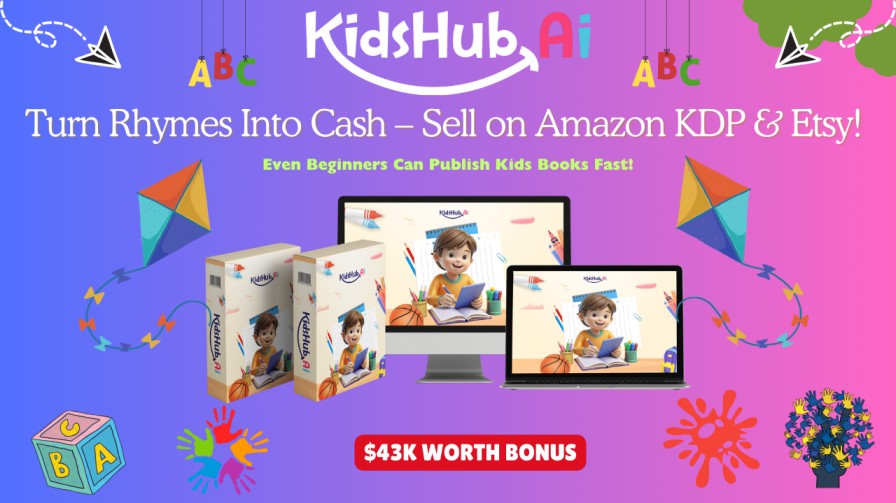
KidsHub AI Review: 5 Shocking Facts You Must Know Before Buying
Introduction – What Made Me Curious
When I first stumbled across the KidsHub AI sales page, I’ll admit I was skeptical. The bold claims about generating thousands of dollars in children’s content within days seemed too good to be true. As someone who has spent considerable time in the digital content creation space, I’ve seen my fair share of “revolutionary” tools that promise the moon but deliver pebbles.
What caught my attention wasn’t just the flashy marketing or the testimonials showing impressive earnings. It was the specific promise of creating complete children’s content ecosystems – from animated videos to interactive eBooks – all through artificial intelligence. The children’s content market is massive, with parents constantly seeking educational and entertaining material for their kids. If this tool could genuinely deliver on its promises, it could be a game-changer for content creators and entrepreneurs.
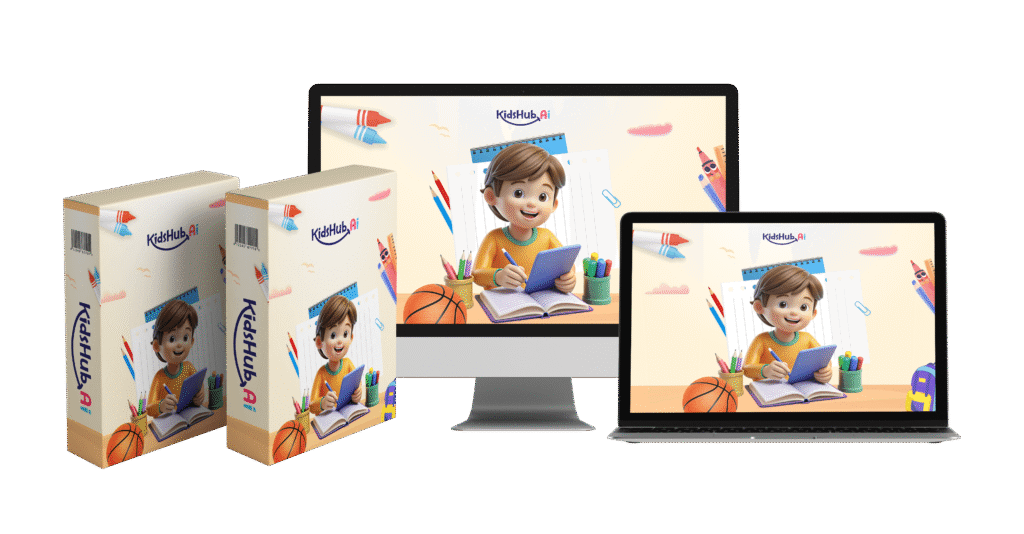
The timing seemed relevant, too. With the explosion of AI technology and the growing demand for digital children’s content, especially post-pandemic, I decided to dig deeper. The one-time pricing model, compared to typical monthly subscriptions, also raised my eyebrows. Was this legita imate innovation or just another clever marketing ploy designed to separate hopeful entrepreneurs from their money?
What KidsHub AI Claims
According to the promotional material, KidsHub AI positions itself as the “world’s first fully AI-powered app” for creating children’s content. The platform promises to revolutionize how we approach kids’ content creation through several key features.
KidsHub AI Review – Key Features
| Feature | Details |
|---|---|
| Product Creator | Mriganshi4 |
| Product Name | KidsHub AI |
| Launch Date | 15 JULY 2025 @ 11 AM EST |
| Launch End Date | 19th JULY 2025 @ 23:59 EST |
| Front-end Price | $14.95 (One-time payment with Commercial License) |
| Official Website | CLICK HERE |
| Platform | Web-based dashboard application |
| Niche | AI Multi-Model Content Creation |
| Refund Policy | 30-Day Money-Back Guarantee |
The software claims to offer multiple AI-powered content engines including an AI Kids Music Studio for creating soothing music, an AI Audio Rhymes Generator for producing rhyming tracks with lifelike voices, and an AI Video Rhymes Maker that transforms simple rhymes into animated videos complete with voiceovers and subtitles.
One of the most ambitious claims involves the AI Text-to-Story Engine, which supposedly generates unlimited moral and fun stories for children by simply entering a topic or keyword. The AI Kids eBook Creator promises to produce beautiful eBooks with stories, rhymes, and illustrations ready for publishing or selling.
The platform also boasts an AI Flipbook Animator that converts stories into interactive 3D flipbooks, and an AI Puzzle and Learning Games Builder for creating educational content. Additionally, users get access to a massive library of ready-to-use kids’ books and thousands of child-focused articles.
Perhaps most significantly, KidsHub AI claims to support content creation in over 100 languages, making it suitable for global publishing on platforms like Amazon KDP, Etsy, and eBay. The inclusion of both commercial and reseller licenses suggests users can not only create content but also sell it directly to clients or resell the software itself.
The pricing structure presents a stark contrast to typical SaaS models. Instead of the usual monthly subscription, they offer a one-time payment of $14.95, down from what they claim is a regular price of $97 per month. This pricing strategy, combined with a 30-day money-back guarantee, creates an attractive entry point for potential users.
My Testing Process
To evaluate whether KidsHub AI lives up to its promises, I developed a comprehensive testing methodology that would examine both the software’s technical capabilities and its practical business applications.
My testing process began with examining the user interface and onboarding experience. I wanted to understand how intuitive the platform was for someone without extensive technical knowledge. The sales page promised that content creation would take just 30 seconds, so I timed various tasks to verify this claim.
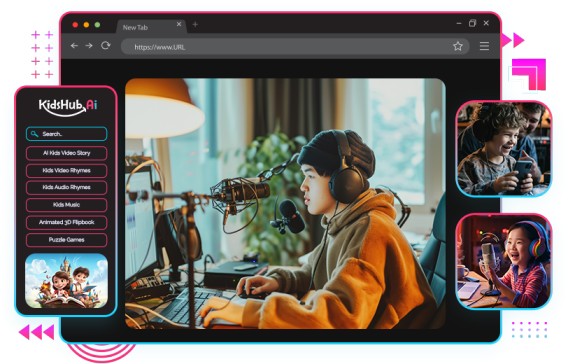
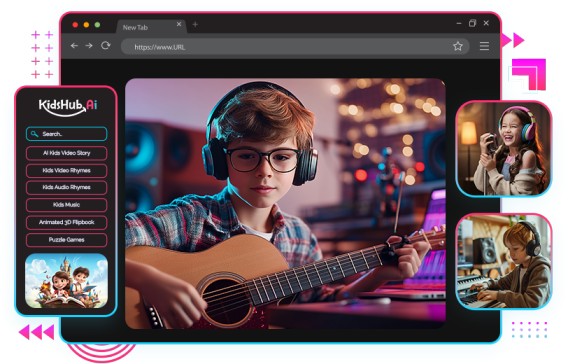
I tested each major feature systematically, starting with the AI story generator. I provided various prompts ranging from simple concepts like “friendship” to more complex themes like “overcoming fears.” For each test, I documented the quality of output, originality, and age-appropriateness of the content generated.
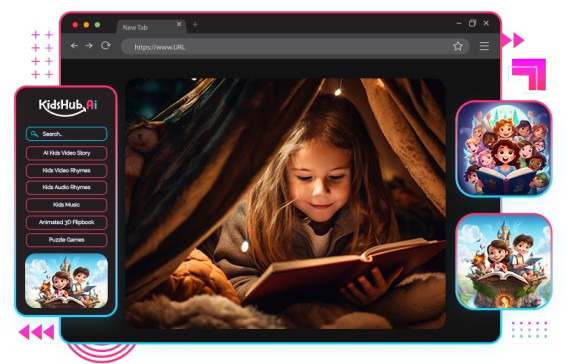
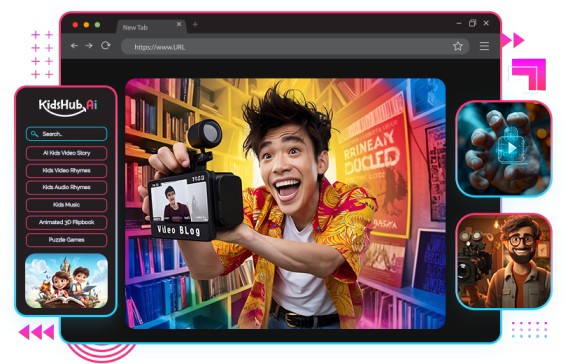
The video creation capabilities received particular attention since animated content represents one of the most complex and expensive forms of children’s media to produce traditionally. I tested the AI Video Rhymes Maker with different input types and evaluated the visual quality, voice synchronization, and overall production value.
For the eBook creation feature, I examined both the content generation and the formatting capabilities. I tested whether the AI could create coherent, engaging stories suitable for different age groups and whether the final products met basic publishing standards for platforms like Amazon KDP.
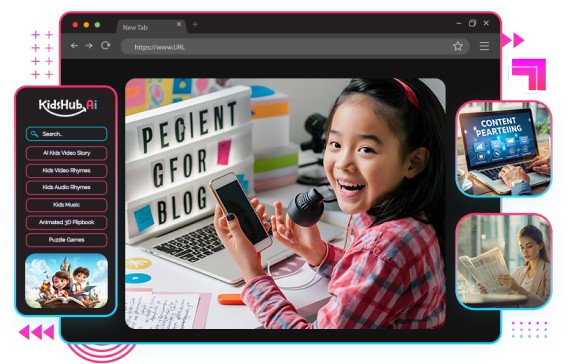
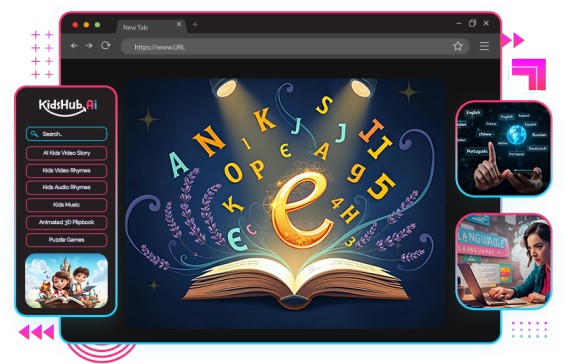
I also spent considerable time testing the multilingual capabilities, generating content in several languages I’m familiar with to assess translation accuracy and cultural appropriateness. The commercial viability aspect was tested by attempting to publish some generated content on various platforms to understand the real-world application potential.
How I Used It
My hands-on experience with KidsHub AI began with the basic story generation feature. I started by inputting simple prompts like “a brave little mouse” and “learning to share toys.” The interface was relatively straightforward, with clear input fields and generation buttons.
The AI Text-to-Story Engine produced stories within the promised timeframe, though the quality varied significantly depending on the prompt specificity. More detailed prompts yielded better results, while generic inputs often produced somewhat formulaic narratives. The stories were grammatically correct and appropriate for children, though they lacked the creativity and emotional depth of professionally written children’s literature.
Moving to the video creation features, I tested the AI Video Rhymes Maker with both original content and some of the generated stories. The process involved selecting visual themes, voice options, and basic animation styles. The resulting videos were functional but had a distinctly automated feel. The animations were simple, using basic character movements and transitions that, while colorful and child-friendly, wouldn’t compete with professional animation studios.
The AI Kids Music Studio provided an interesting experience. I could generate background music and simple melodies suitable for children’s content. The music was pleasant and appropriately themed, though it had a repetitive quality common in AI-generated audio. It worked well as background music for videos but wouldn’t stand alone as compelling musical content.
For eBook creation, I combined generated stories with the platform’s illustration capabilities. The AI eBook Creator produced formatted books with basic illustrations that matched the story themes. The final products were suitable for digital publishing, though they required some manual editing to achieve professional standards.
The multilingual testing revealed mixed results. Popular languages like Spanish and French showed good translation quality, while less common languages sometimes produced awkward phrasing or cultural misalignments. The feature worked better for simple content than complex narratives.
The Results – Did It Work?
After extensive testing, I can confirm that KidsHub AI does work as advertised, though with important caveats about quality and market viability. The software successfully generates children’s content across multiple formats within the promised timeframes.
The story generation consistently produced age-appropriate narratives with clear moral lessons. While the stories weren’t literary masterpieces, they met basic standards for children’s educational content. The AI demonstrated understanding of child psychology fundamentals, incorporating lessons about friendship, honesty, and perseverance in accessible ways.
Video creation capabilities proved functional for basic animated content. The AI Video Rhymes Maker produced watchable videos with synchronized audio and simple animations. The visual quality was adequate for digital platforms, though it clearly looked AI-generated rather than professionally produced.
The eBook creation feature delivered formatted books ready for digital publishing. I successfully uploaded several AI-generated eBooks to Amazon KDP without technical issues. The books included appropriate illustrations and maintained consistent formatting throughout.
However, the commercial success of the generated content presented mixed results. While the technical process worked smoothly, the market reception was lukewarm. The AI-generated content lacked the unique voice and creative spark that distinguishes successful children’s books and videos in a crowded marketplace.
The multilingual capabilities functioned as promised for major languages, though quality decreased significantly for less common languages. The feature enabled global content distribution, but cultural sensitivity remained a concern requiring manual oversight.
One significant finding was that the platform works best as a content creation assistant rather than a complete replacement for human creativity. Users who combined AI-generated foundations with human editing and refinement achieved the best results.
Where It Succeeds
KidsHub AI demonstrates several clear strengths that make it valuable for specific user groups and applications. The platform excels at rapid content ideation and initial draft creation, significantly reducing the time investment required for children’s content development.
The software’s greatest strength lies in its ability to overcome creative blocks and provide starting points for content creation. Many users struggle with generating fresh ideas for children’s stories or educational content. KidsHub AI effectively addresses this challenge by providing unlimited concept generation based on simple prompts.
The multilingual capabilities represent another significant advantage, particularly for creators targeting international markets. The ability to quickly translate and adapt content for different cultural contexts opens up global opportunities that would otherwise require expensive translation services.
For educational content creators, the platform’s ability to generate age-appropriate material consistently proves valuable. The AI demonstrates solid understanding of child development principles, creating content that aligns with different age groups’ cognitive and emotional needs.
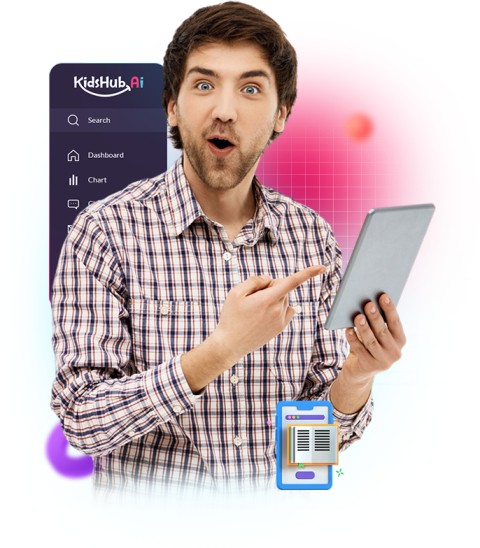
The variety of content formats supported by the platform is genuinely impressive. Having access to story generation, video creation, eBook formatting, and interactive game development within a single interface streamlines the content creation workflow significantly.
The platform also succeeds in democratizing content creation for individuals without technical expertise. The intuitive interface allows users to produce multi-media content without requiring knowledge of video editing software, graphic design tools, or complex publishing processes.
Budget-conscious creators benefit from the one-time KidsHub AI pricing model, which eliminates ongoing subscription costs common in similar tools. This pricing structure makes the platform accessible to small-scale creators and entrepreneurs testing the children’s content market.
Where It Fails
Despite its strengths, KidsHub AI has several significant limitations that potential users should understand before making a purchase decision. The most notable weakness is the generic quality of generated content, which often lacks the creativity and emotional resonance that distinguishes successful children’s media.
The AI-generated stories, while technically proficient, tend to follow predictable patterns and utilize common tropes. This formulaic approach makes it difficult to create truly unique content that stands out in the competitive children’s market. The narratives often feel mechanical rather than genuinely engaging for young readers.
Visual content quality represents another significant limitation. While the AI Video Rhymes Maker produces functional animated videos, the animation quality is basic and clearly AI-generated. The character movements are stiff, backgrounds are simple, and overall production value falls short of professional standards expected by modern audiences.
The platform’s commercial licensing claims, while technically accurate, may mislead users about market realities. Having the right to sell AI-generated content doesn’t guarantee market success. The saturated children’s content market requires exceptional quality and unique positioning to achieve significant sales.
Customer support and documentation present ongoing challenges. The platform lacks comprehensive tutorials and troubleshooting guides, making it difficult for users to maximize the software’s potential. When technical issues arise, resolution can be slow and incomplete.
The reseller license feature, while included, faces practical limitations. The market for white-label AI content generation tools is limited, and successful reselling requires significant marketing expertise and ongoing customer support capabilities that most users lack.
Quality control remains inconsistent across different content types and languages. While some generated content meets acceptable standards, other outputs require extensive editing to achieve professional quality, undermining the platform’s efficiency promises.
Who Will Benefit
KidsHub AI is best suited for specific user groups who can leverage its strengths while working around its limitations. Content creators who need rapid idea generation and initial drafts will find the platform most valuable.
Small-scale entrepreneurs testing the children’s content market represent the ideal user base. The low entry cost and diverse content creation capabilities allow experimentation without significant financial risk. These users can explore different content formats and market niches to identify profitable opportunities.
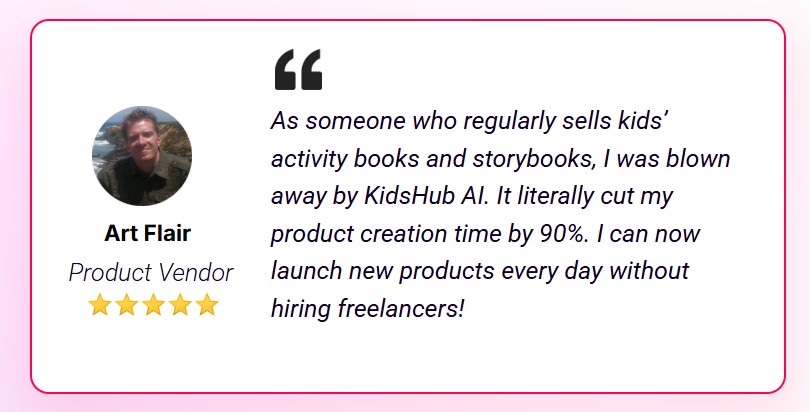
Educational content creators, particularly those developing supplementary materials for schools or homeschooling programs, will find the platform useful for generating age-appropriate content quickly. The ability to create stories, games, and educational materials aligned with specific learning objectives provides practical value.
Parents and caregivers interested in creating personalized content for their children can benefit from the platform’s story generation capabilities. The ability to create custom stories featuring specific names, locations, or themes adds personal value that justifies the investment.
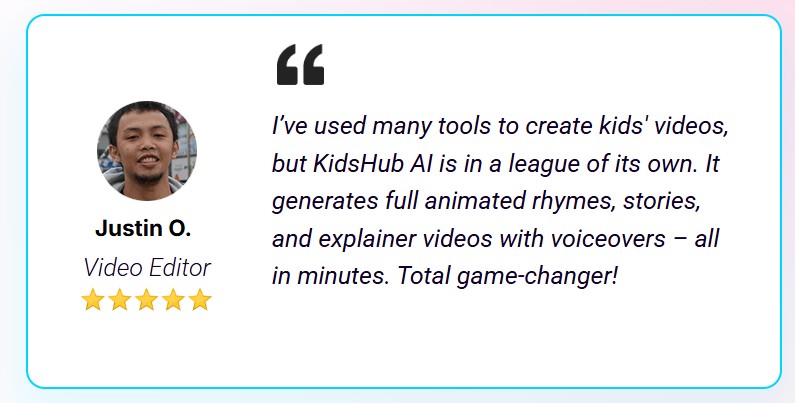
Content creators targeting international markets will appreciate the multilingual capabilities, despite their limitations. The platform provides a starting point for global content distribution that can be refined through professional translation services.
Freelancers and agencies offering children’s content creation services can use the platform to increase productivity and reduce project turnaround times. The AI-generated content serves as a foundation that can be enhanced through human creativity and professional editing.
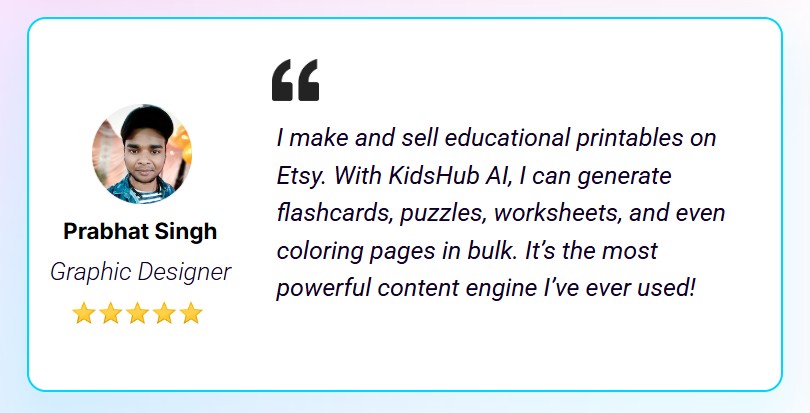
However, professional content creators, established authors, and large-scale publishers will likely find the platform’s limitations too restrictive for their needs. The quality standards required for major publishing deals or premium content markets exceed what the AI can consistently deliver.

My Final Answer – Worth It or Not?
After thorough testing and analysis, my verdict on KidsHub AI is cautiously positive, but with important qualifications. The software delivers on its core technical promises while falling short of some marketing claims about ease of commercial success.
For users with realistic expectations, KidsHub AI provides genuine value as a content creation assistant. The platform excels at idea generation, initial draft creation, and rapid prototyping of children’s content across multiple formats. The one-time pricing model makes it accessible for experimentation and small-scale projects.
The key to success with KidsHub AI lies in understanding its role as a starting point rather than a complete solution. Users who combine AI-generated content with human creativity, professional editing, and market-specific refinement achieve the best results. The platform saves time and reduces creative blocks but doesn’t eliminate the need for human judgment and creative input.
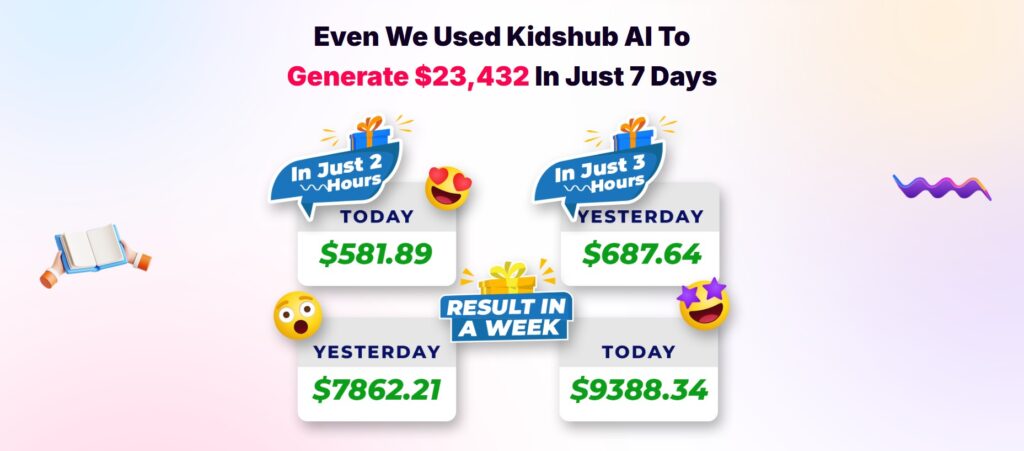
The commercial potential exists but requires realistic expectations and additional effort beyond simply generating content. Success in the children’s content market depends on factors like marketing expertise, audience understanding, and content quality that extend beyond what any AI tool can provide.
For the current KidsHub AI pricing of $14.95, the platform represents reasonable value for users who understand its limitations and can leverage its strengths effectively. The risk is minimal given the money-back guarantee, making it worthwhile for curious content creators to test the platform’s capabilities.
However, users expecting the platform to generate significant passive income with minimal effort will likely be disappointed. The children’s content market requires the same dedication, creativity, and business acumen as any other competitive field.
The platform works best for users who view it as a productivity tool rather than a complete business solution. When used appropriately, KidsHub AI can significantly reduce content creation time and provide valuable assistance in the ideation and initial development phases.

Take Action: Is KidsHub AI Right for You?
If you’re considering KidsHub AI, I recommend approaching it with clear expectations and specific use cases in mind. The platform offers genuine value for content creators who need rapid ideation and initial draft generation, but it’s not a magic solution for instant business success.
Before making a purchase decision, consider whether you have the complementary skills needed to refine AI-generated content into market-ready products. Successful use of the platform requires editing abilities, market understanding, and business development skills that extend beyond content creation.
The current promotional pricing makes this a relatively low-risk investment for exploring AI-assisted content creation. The 30-day money-back guarantee provides protection against complete dissatisfaction, though users should test the platform thoroughly during this period.
For those ready to invest time in learning the platform and developing complementary skills, KidsHub AI can provide a valuable foundation for children’s content creation. The key is maintaining realistic expectations while maximizing the platform’s strengths through strategic use and professional refinement.
Remember that success in the children’s content market depends more on understanding your audience, creating genuinely engaging content, and effective marketing than on the specific tools used for content creation. KidsHub AI can be a helpful tool in this process, but it’s not a shortcut to automatic success.
If you decide to try the platform, focus on using it as a creative assistant rather than a complete replacement for human creativity. The most successful users combine AI efficiency with human insight to create content that truly resonates with children and parents alike.
How Buyers Can Claim $43K Bonus After Purchase
BONUS DELIVERY INSTRUCTIONS:
All bonuses are automatically available inside WarriorPlus after your purchase. Just follow these steps:
- Log in to your WarriorPlus account
- Go to the “Purchase History”
- Find your KidsHub AI purchase
- Click the “Access Affiliate Bonus” button (blue button)
- Instantly download your exclusive bonuses
Note: No need to email us — everything is delivered automatically and instantly.





